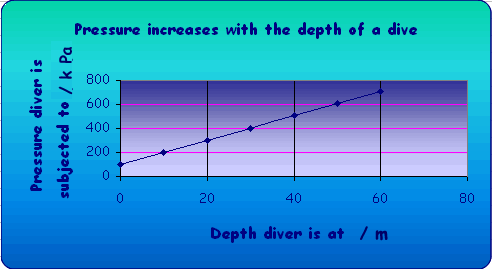Oceans Pressure within the oceansEven though we do not feel it, 101,000 pascals of pressure is pushing down on our bodies as we rest at sea level. Our body compensates for this weight by pushing out with the same force as the atmosphere pushes on us. As water is much denser than air, this pressure increases as we venture into the water. For every 10m we decend into the depths of the ocean one more atmosphere of pressure pushes down on us. For example, at 20m deep we have three atmospheres of pressure pushing on us - two from the water and one from the air pushing on the sea's surface.
To travel into this high-pressure environment we have to make some adjustments. Humans can stand three or four atmospheres and still be okay. To go farther down we need to decend in a submarine as the pressure would be too great and would crush our inner organs. But it is not only the pressure of the water that is a problem as you go deeper in the ocean - the presure has an effect on the air gases that get absorbed into your bloodstream. Henry's law states that "at a constant temperature, the amount of a given gas dissolved in a given type and volume of liquid is directly proportional to the partial pressure of that gas in equilibrium with that liquid." The air we breathe on the Earth's surface contains roughly 79% nitrogen and 21% oxygen, and so does the compressed air stored in a standard diving tank. For a scuba diver, Henry's law means that when diving, as the depth you go to increases, so does the pressure and this causes the amount of nitrogen being dissolved into your bloodstream to increase - something that causes us to experience 'the bends'. Animals that live in the watery environment of the oceans undergo large pressure changes in short amounts of time - something that would give us 'the bends'. Sperm whales make hour-long dives 2,250 meters down. This is a pressure change of more than 223 atmospheres! By studying and understanding how these animals are able to withstand great pressure changes, scientists will be able to build better tools for humans to make such journeys.
|
Follow me...
|







